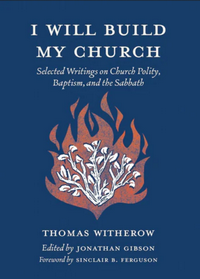 I Will Build My Church:
I Will Build My Church:
Selected Writings on
Church Polity, Baptism, and
the Sabbath
by Thomas Witherow, Edited by Jonathan Gibson
DETAILS: Publisher: Westminster Seminary Press Publication Date: January 29, 2022 Format: Hardcover Length: 251 pg. Read Date: July 2-16, 2023

What’s I Will Build My Church About?
Thomas Witherow was an Irish Presbyterian pastor in the mid-Nineteenth Century, who later became a professor. Over the course of his ministry–in part thanks to the revivals of the time–he saw more competition in Ireland to the Presbyterian Church from a variety of Protestant groups. He also saw that too many Presbyterian members or ministers couldn’t define or defend the distinctives–many seeing them as a tradition more than a conviction.
One of Witherow’s driving missions was to help the Presbyterians he taught amongst to see that their distinctives were serious and defensible. He also wanted to explain them to the other Protestants and possibly convince them to at least consider them.
This is a collection of three of his works along those lines–about ecclesiology, sacraments, and the Sabbath–slightly edited for modern standards. Long sentences turned in to multiple, spelling updates, and so on–and the Bible citations modified to be the ESV. That sort of thing.
A Prince of Irish Presbyterianism
Before we get into the works, the editor, Jonathan Gibson, provides an almost 80-page biography of Witherow–sketching his education, family life, pastoral work, writing, and professorial work.
I just picked this up to read Witherow, and hadn’t counted on learning anything about him and it was a great bonus for me to get more context for his work both in terms of his own life and the Church situation he found himself in.
The Apostolic Church
Odds are, if you know anything that Witherow wrote, it’s this short book (in this edition, it’s about seventy pages long). The subtitle to this is “Which is it? – An Inquiry at the Oracles of God as to Whether Any Existing Form of Church Government is of Divine Right.” Which is a pretty good summary of the work.
Witherow’s convinced that too many people (no matter their preferred ecclesiology) see it as a matter of convenience, taste, and traition. He cannot abide by that kind of thinking–convinced that if the Church cannot find Scriptural endorsement of a way of doing something, it ought to be abandonded.
Witherow starts this work by listing and explaining six principles he sees in the Apostolic Church then he looks at the three forms of church government–prelacy (whether in Roman Catholic or Anglican form), congregational, and presbyterian–to see which, if any, does the best job of embodying those principles.
Scriptural Baptism
This is a slightly shorter book on the subject of Baptism–tackling (in turn) the mode of baptism and the subjects of it.
He deals with the question of mode pretty quickly–first by Scriptural evidence and then moving to practical considerations.
Then he moves on to the issue of the subjects of baptism–from the outset, he’s careful not to let prominent Irish Baptists set the terms of the debate, instead he reframes the typical way these conversations went in his circles. Rather than starting with the positions of the baptists and then responding to them, he sets out a few points he wants baptists to answer–and then shows how (from his vantage point, anyway) they cannot.
The Sabbath
The book on the Lord’s Day/Sabbath is more pointed than the others. Witherow takes a pretty traditional path–defining moral and ceremonial law at the outset. Then he addresses Christ’s attitude toward and teaching about the Sabbath before getting into the abrogation of the ceremonial law and the practice of the New Testament church.
Then Witherow addresses a move to adjust the equivalent of the Blue Laws there to make Sunday a day for amusement (I’m a little vague on the details and it’d take to long to explain my guesses). Basically, where you could go pay for theaters and shopping and the like. Witherow follows his explanation for the Christian observance of the Lord’s Day with a warning about what will happen if the laws are changed–how it will negatively impact workers, businesses, and the economy–in addition to the church.
Say what you will about Blue Laws (and I have plenty to say in other contexts), Witherow was spot-on with his predictions.
So, what did I think about I Will Build My Church?
I spent a lot of time with The Apostolic Church almost twenty years ago–I used it and a paper by him to compare with some contemporary American ecclesiologies. I haven’t read it since for a variety of reasons (mostly overkill), but man, it was fun to come back to it.
I appreciate the footnotes Gibson added, but I’m not so sure that we needed the ESV update. I don’t know what it gained, outside of maybe making it more accessible for contemporary readers. But those who are going to need an ESV rather than the AV for translation are really going to be put off by Witherow’s insistence to call the baptists Anabaptists throughout the second book. He’s definitely not a 21st century writer
I enjoyed all these books–and Gibson’s biography was a great bonus. The photographs of Witherow and his family were unexpected, too.
Sharp, concise writing, with a little bit of punch (but not quarrelsome). This is a great introduction/tutorial on Presbyterian Church distinctives. Highly recommended.

![]()



Read Irresponsibly, but please Comment Responsibly